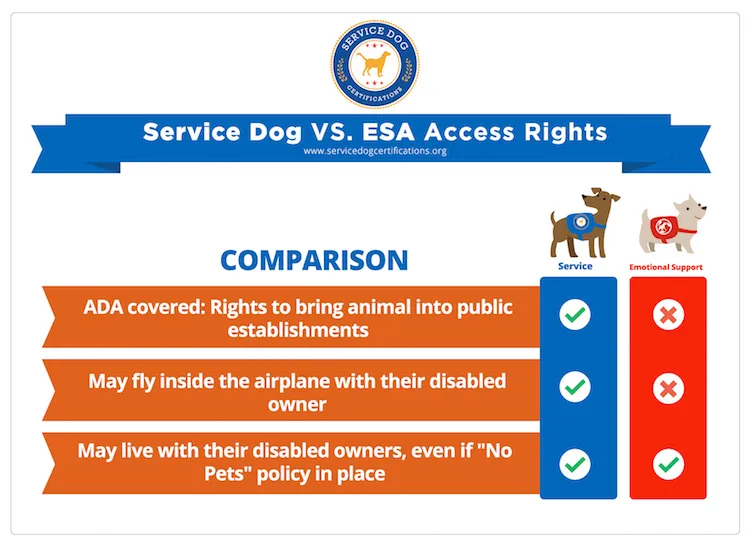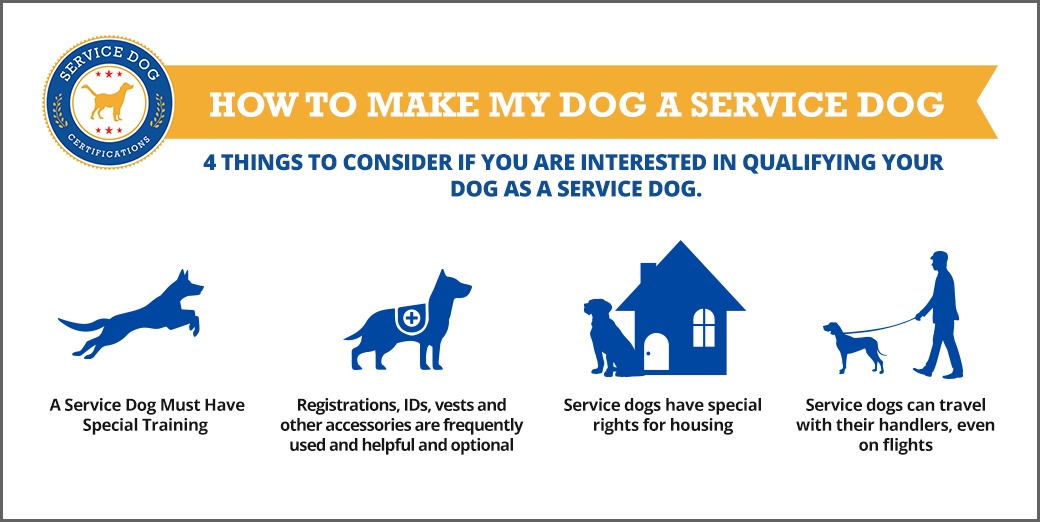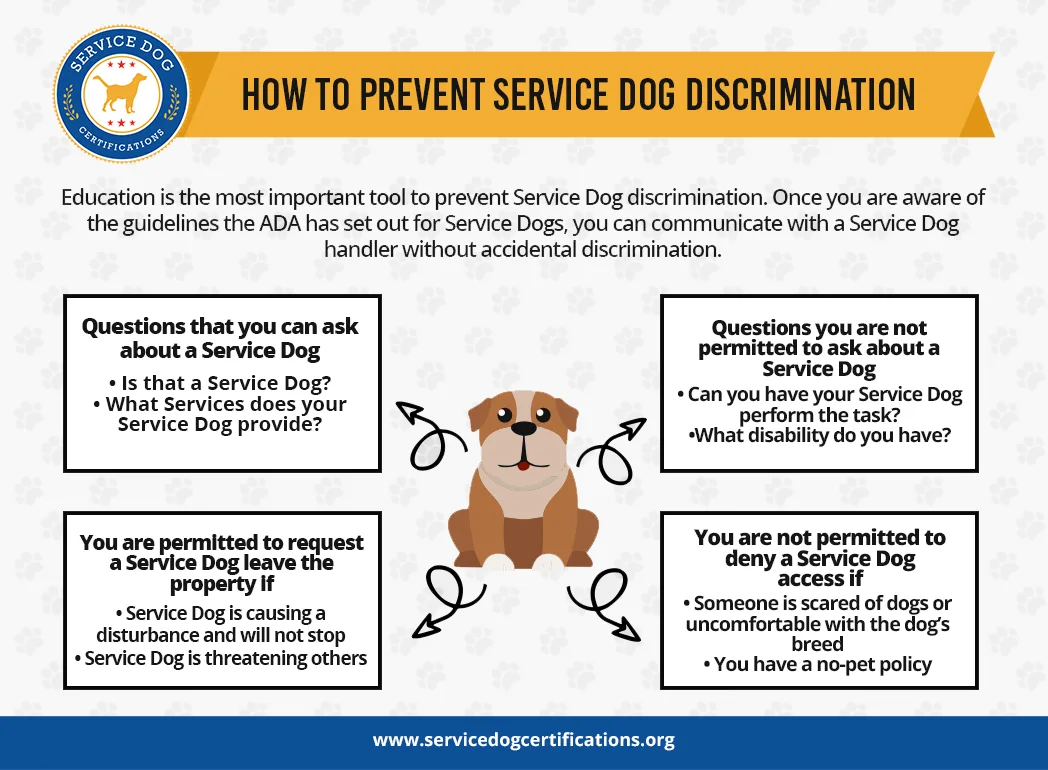Service Dog Rights

1. Service Dogs have special public access rights under federal law
Service dog owners have special rights under both federal and state laws. The Americans with Disabilities Act, commonly known as the “ADA,” is the primary federal law protecting owners of service dogs in all 50 states.
Under the ADA, service dog owners have the right to enter places normal pets can’t. Service dog owners have broad public access rights in places like stores, restaurants, schools, arenas, and movie theaters.
The ADA, however, is not the only law that protects service dog owners. Service dog owners can also board flights free of charge pursuant to the Air Carrier Access Act and the U.S. Department of Transportation guidelines.
Not only that, service dog owners can also live with their service dogs in buildings that ban pets. Under the Fair Housing Act and guidelines from the U.S. Department of Housing and Urban Development (HUD), landlords must reasonably accommodate service dog owners without any fees or deposits.
That means service dogs are allowed to live with their owners without charge, even if the building usually doesn’t allow animals of any kind.
Finally, most states also have laws that protect owners of service dog owners. These laws generally mirror federal service dog laws and provide an additional layer of protection for service dog owners.
2. What is the definition of a Service Dog?
A service animal is a dog that has been trained to perform a job or task that assists with a person’s disability. Service dogs can be used by both people with physical and mental disabilities. A service dog used by someone with a mental health condition is called a psychiatric service dog.
For example, a service dog might pull a wheelchair for someone with a mobility disability or provide pressure therapy to calm a person with post-traumatic stress disorder.
Whatever the condition may be, it has to be severe enough to substantially limit a major life activity like working or sleeping.
Dogs are the only type of animal allowed to be a service animals under the ADA’s rules. Other types of animals like cats, birds, small reptiles, and rabbits can be emotional support animals which is a different type of assistance animal.
3. What different rights do service dogs, and emotional support animals have?
Emotional support animals provide comfort to people with mental health disabilities like depression, severe anxiety, bipolar disorder, or PTSD. Unlike psychiatric service dogs, they do not require any specialized training. ESAs do their jobs just by being present around their owners to provide comfort during difficult times.
Psychiatric service dog owners do not need any special documentation to prove that they are a service dog owner (other than for flights as discussed below). ESAs, on the other hand, require a letter from a licensed healthcare professional like a doctor or therapist.
ESAs and service dogs have very different legal rights. ESAs primarily have rights for housing, meaning they are allowed to live in no-pet buildings free of charge. ESAs do not have the broader public access rights that service dogs have. That means ESAs cannot enter stores, restaurants, or airplanes.

4. Service dog public access rights
Under the ADA’s rules, state and local governments and businesses that serve the public must allow service dogs to accompany their handlers in all areas of the facility where the public is allowed to go.
Places service dogs have access to include:
- Restaurants
- Grocery Stores
- Office or any place of work
- Beaches
- National Parks
- Coffee Shops
- Farmers Markets
- No-pet apartments
- Hotels
- Movie Theaters
- Rideshare and taxis
A service dog’s owner to access public spaces is not absolute. A service dog owner can be asked to leave if their service dog creates an unsafe or unhealthy environment for others. For example, a service dog that is not under the handler’s control or acting aggressively can be asked to leave the premises. Service dogs are allowed to board flights free of charge. To fly with a service dog, the owner must complete and submit the DOT’s Service Animal Air Transportation Form to the airline prior to boarding the flight.
5. Service dog verification
Third parties and landlords can ask two questions, and only these two questions, to verify that someone has a service dog:
- Is the dog a service animal required because of a disability? and
- What work or task has the dog been trained to perform?
Staff members at a facility are not allowed to ask for details about a person’s disability, require medical documentation, require a special ID card or training documentation. Third parties cannot ask the dog to demonstrate the job or task that it was trained to do.
Service dog accessories like ID cards, registrations, and vests do not confer rights on their owners. However, they are frequently used by service dog owners to easily signal that their dog is a service animal. These items should only be used by service dog owners with fully trained service dogs. Some psychiatric service dog owners will obtain optional Psychiatric Service Dog Letters. PSD letters are documents signed by licensed healthcare professionals that opine on whether someone has an eligible mental health disability for the purposes of owning a psychiatric service dog.
6. What happens if you violate the rights of a service dog owner?
People that violate the rights of a service dog handler can get into serious trouble and be subject to legal repercussions. The U.S. Department of Justice, HUD, and the Department of Transportation can take action against individuals that violate service dog rules.
For example, the following situations can lead to a lawsuit:
- A store that improperly denies entry to a service dog.
- A café that asks inappropriate questions to a service dog owner, such as the nature of their disability.
- An airline that charges a passenger with a service dog a special fee.
- A landlord who refuses to allow a tenant to live with their service dog.
Businesses and landlords have been sued when they have violated applicable disability laws that pertain to service dog owners. As a business, landlord, or other institution, it’s important to understand service dog rules to avoid potential fines and legal headaches.
About the Author: The writing team at Service Dog Certifications is made up of folks who really know their stuff when it comes to disability laws and assistance animals. Many of our writers and editors have service dogs themselves and share insights from their own experiences. All of us have a passion for disability rights and animals.
20 comments
Leave a Reply Cancel reply
Latest Posts

Dangerous Materials Hiding in Your Dog Products
Jake’s German Shepherd began developing strange rashes around his collar. Three vet visits later, they figured out the leather was treated with chromium — a chemical that irritates sensitive skin. Jake had no idea his dog’s collar contained industrial chemicals. Most dog owners don’t know what goes into the products they buy. Many companies use […]

Read More

Can You Bring a Service Dog to a Basketball Game?
Yes, you absolutely can bring your service dog to basketball games. Whether you’re heading to your local high school tournament, a packed college rivalry game, or splurging on NBA tickets, the Americans with Disabilities Act protects your right to be accompanied by your service dog anywhere the public can go. When you arrive, venue employees […]

Read More

Best Pet Health Insurance Providers
If you own a pet, you know how important — and expensive — vet care can be. One way to offset those costs is to purchase pet health insurance. Like typical health insurance, pet insurance is available at many price points, and can cover all, most, or only some of your vet-related costs. It can […]

Read More


I have a emotional service dog 🐕🦺 for my PTSD a letter from my psychiatrist. I go out every Friday with my boy friend to a restaurant that has outdoor seating and my little 5lb dog is in a pouch on my hip. We are sitting at table like we always do. One waiter came over took our drink order. Then our waitress comes over and waits on us and brings back our appetizers. She then comes back to table to take our dinner order. All this time my little service dog is in her pouch not barking not bothering anyone. She then tells me I have to put the dog on the ground. I told her was a service dog and explained that the dog could not be in a chair 🪑 or on the restaurant the. She then went and got the manager and he treated me with such disrespect that he made me feel like I was an idiot and I needed to go. I was so upset and hurt 😢. I left the table and walked back to my boyfriends apartment. I was so hurt he triggered me. I did not eat dinner. Next day we went to the pool at his apartment where the owner of restaurant and Manager came over to my boyfriend and said he was in violation and that I needed to leave and he was going to have to pay a fine. When my boyfriend let the owner speak again very disrespectful with him and treated him like he is in big trouble and the owner of his apartment will be notified. After the owner of restaurant my boyfriend said that is a service dog. The owner mood changed instantly and was nice and said oh just bring me a copy of her card and you will be ok. This is what he needed. Again the owner of restaurant came over by the pool where I was sitting and treated me like I was a piece of trash. What are my rights. I’m not a vindictive person but I feel the Owner and Manager need to know the laws. The manager the night before when he came to my table while he was yelling out loud the entire restaurant clapped their hand 👏🏻 Like way to go Manager she needs to go with her dog. Again I felt so hurt 😭. Did he have the right to make me look like I was a person breaking the law?? Please if anyone can tell me what or how I should handle this? I would appreciate any support. Thank you
You have a psychiatric service dog if it is tasking to your PTSD, not just there for comfort. The dog must be trained to complete a task for you . They are to be on the floor in restaurants. Service dogs are allowed on pool decks. You do not need any registration nor certification per the ADA law.
How do you get a non service dog certificate I have a emotional support dog!
In order to qualify for an ESA, your licensed mental health professional must diagnose your mental health disability and agree that a dog would be helpful as your treatment. You may find this article on how to qualify for an ESA interesting
https://www.servicedogcertifications.org/how-to-qualify-for-an-emotional-support-animal/
Pull the dogs card out show them and if they are still being a jerk tell them I’m not leaving call the cops and stand your ground.
A little late but I think I can help a little. Emotional support dogs don’t have the same rights as Service dogs. The restaurant owner had the right to ask you to leave when you didn’t put your dog on the ground, but not to follow you to the pool of your apartment. ESD’s are permitted by law to be on that property and they cannot ask you to leave because of your dog. It is highly illegal to be threatened with a fine when they don’t even own the property, and it could even be seen as malicious intent if they saw you at the pool and decided to tell you to leave due to a previous encounter.
Hope this helps!
A legitimate note from a practicing and licensed medical professional stating your PTSD is all you need to have your dog as a Service dog. PTSD is a condition that allows for the accomlaniment of a service dog. Making me feel better is not and gets you to an Emotional Support Animal which does not have privileges anywhere other than under FHA (fair housing) rules. There is absolutely no such thing as certifying a dog as a service animal…only the owners need for one. Anyone who tells you otherwise or charges for an i.d. card is a fraud and just wants to take your money. BTW, a legitimate service animal must be on the floor (unless a specific disability requires otherwise) and well behaved otherwise the proprietor has every right to ask it to be removed. Therapy dogs are entirely.different and require training but have zero privileges to go anywhere unless welcomed or invited. These animals bring joy to others rather than assisting their handler.
Are there service cats being used
The Americans with Disabilities Act (ADA) states that only dogs or miniature horses are recognized as service animals. Cats and other animals however can become an Emotional Support Animal. They don’t have quite as many access rights but are protected for travel and in no-pet housing. You may find this article on cats and service animals interesting https://www.servicedogcertifications.org/can-cats-be-service-animals/
I stay in apartment complex and I have PTSD dog where I have blackouts my dog was not on a leash due to me being outside to let him go potty the apartment manager said I need to keep him on a leash if have a episode how is he going to get help for me if I have him on a leash And they have all the proper paperwork from my Doctor Who do I need to speak to about this manager constantly aggravating me about my dog
We were in the park with our dog training her and someone kicked her incthe head her owner was chased by the man for over 1 hour. He stopped the police who disregarded him as hes deaf then took his dog. Hes my carer l was also chased but hid the police refused to take notice of us took his dog. Now after one month. They are asking for his owner to attend the police station. We nervous to exercise our other dog locally. As the cazy man who chased us around the park saying our dogs are dead they die today is stillout there my friend told the police his dog helps him alerting him of the phone and the door and buzer shes his hearing dog. Now they want a certificate. To provide proof. We are at the end of our tether. Upset by the loss of our dog . What do we do we were the victims in this. Wecare being punished for being attacked in the park. Can you help.
My daughter has a service dog in school. We have a legal mediation to protect both there, but I believe the school feels it’s only to protect them, although it’s my daughter who needs protection! My daughters teachers have grabbed the leash countless times in this district, taking her dog away, for no reason. They are not understanding you cannot do this! What can I do?
hello im a diabetic can I get a service dog? I have a poodle whose great at sniffing we’ll trained. would my dog be a serve dog for my diabetic
Yes, you might qualify for a diabetic service dog. You may find this article on diabetic service dogs interesting https://www.servicedogcertifications.org/what-are-diabetic-service-dogs/
My husband has his service dog (American bully) I also have a service dog (American bully). We have put our home up for sale. And we wanted to rent to RV spots fully able to hook up. The owner told us that he couldn’t rent to us cause of the breed of our dogs.
Me and my husband 100% disabled. Don’t have alot of money but I feel we where all discrimination including our dogs.
Service dog owners cannot be discriminated against solely because their dog is a certain breed.
Can they make me carry dog outside of my condo
Third parties cannot demand that service dog owners carry their dogs.
im staying in a hotel but they will not allow me to have my service dog with me, what can i do?
We suggest speaking to a manager or someone higher up that understands the hotel’s service dog protocols. All hotels are required under the ADA to accommodate verified service dog handlers.